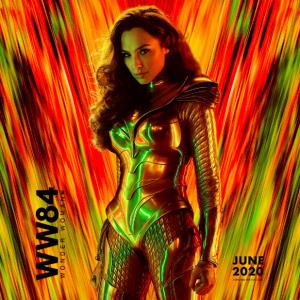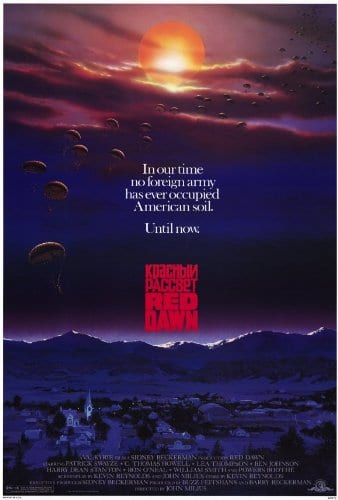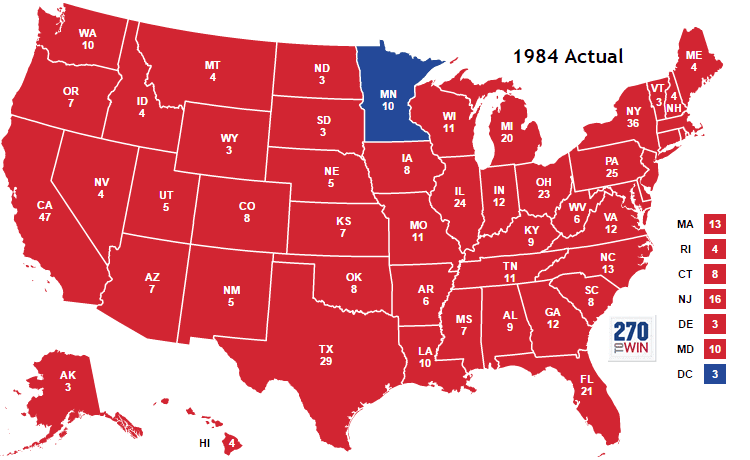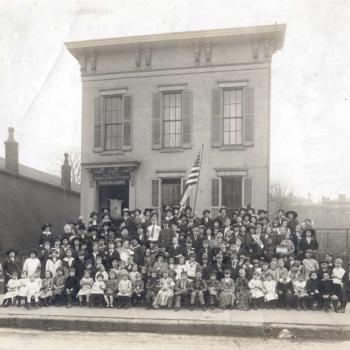I belong to an all-female super-hero-movie-viewing group. Imagine my delight, then, when the trailer for Wonder Woman 1984 dropped this weekend. I was also thrilled for a second reason: I make a big deal out of 1984 in my American history survey course, and I use video clips to do it. I relish adding a new one! But it got me thinking: why set this movie in 1984?
Director Patty Jenkins has said she chose the mid-1980s because that decade “showed mankind at its best and worst. It was grand and wonderful, there was great music and there were elegant and beautiful things. But other things about the decade revealed the worst of us. To have Wonder Woman in that period of time that was us at our most extreme, is wonderful.”

Jenkins may be on to something about 1984 in particular as a year of extremes. I try to get my students into the feel of what it would have been like to live in the 80s by showing them a series of videos they would likely have viewed had they been alive in 1984: an ad, a movie intro, and two presidential campaign commercials. (I may also be trying to keep their attention at the tail end of a semester…) Between them, these videos reveal the 80s to have been a paradoxical moment of great prosperity coupled with great fear.
First, prosperity. I start off by showing the class the famous Apple Super Bowl ad that introduced one of the first affordable personal computers. The ad depicts a group of 1984-like totalitarian pawns with shaved heads and dull jumpsuits watching a supreme leader on a screen spew propaganda. A single blond woman wearing a white tank top and orange wind shorts (hey, it was the 80s) and chased by guards then hurls a hammer into the screen, reducing the talking head to a shower of light. The final line: “On January 24, Apple Computer will introduce Macintosh. And you’ll see why 1984 won’t be like “1984.”” So why not? Because the American economic system has made computer technology and its attendant opportunities for personal expression affordable for the masses.
If I have time, I show students a follow-up: the clever 2011 Motorola Super Bowl ad that recasts Apple as the Evil Empire, to borrow Reagan’s famous phrase for Soviet Russia from his 1983 speech to the National Association of Evangelicals. (Here the peons marching in a line all wear white earbuds!)
The second video clip to emphasize prosperity is President Reagan’s “Morning in America” reelection campaign ad. Quite possibly the cheeriest presidential campaign ad ever, its basic message was that, to quote The Lego Movie, “Everything is awesome!” So why would you switch parties now? In this context, “everything” likewise refers to the economy.

But everything was not awesome. 1984 is also the year of the movie Red Dawn, which depicted Soviets parachuting into a small Colorado town and gunning down its high schoolers. Our heroes escape to the woods to fight back. The heroes include Patrick Swayze, Jennifer Grey, and Charlie Sheen. No joke: it was Dirty Dancing with communists and Charlie Sheen. (Like I said, it was the 80s.) To make this plot seem feasible, the movie opens with a series of hypothetical world events that flash across the screen. Things like “Soviet Union suffers worst wheat harvest in 55 years” and “Greens Party gains control of West German Parliament. Demands withdrawal of nuclear weapons from European soil.” Like falling dominoes, they end with the proposition: “NATO dissolves. United States stands alone.” The movie was wildly successful (unlike when it was remade in 2012 with North Korea as the enemy). In 1984, the world seemed sufficiently unstable to make it just believable enough.
But Reagan knew this too, and addressed it in a second famous campaign ad called “The Bear.” In this year of extremes, this may have been either one of the most or the least subtle presidential campaign ads ever. The ad just shows a bear wandering around in the woods while a voiceover informs us that there may or may not be a bear in the woods and it may or may not be tame. But just to be safe, “Isn’t it smart to be as strong as the bear? If there is a bear?” The accompanying slogan was “Prepared for Peace,” a reference to Reagan’s arms escalation policy designed to break the economy of the Soviet bear. A secondary effect, though, was exacerbating Americans’ fears of nuclear chicken.
Reagan won reelection in what was, to continue with the extremes, one of the most extreme electoral college victories ever. I always hear an audible intake of breath when I show the map to my students. It was a time of great prosperity and great fear, and his campaign successfully spoke to both.

And so I wonder if 1984 is in fact exactly the right year to set a blockbuster movie releasing in 2020. Once again we are in a time of great prosperity and great fear. Unemployment has been steadily falling since 2012 and stands currently at an impressively low 3.5%, the lowest since 1969. At the same time, President Trump has stoked racial fears of immigrants taking away jobs or bringing in violence.
Many of my students are politically conservative, so I have begun flagging the difference in the rhetoric of President Reagan and President Trump. Small-federal-government (except for military spending!) Reagan actually said this in his second inaugural address:
“And there is another area where the Federal Government can play a part. As an older American, I remember a time when people of different race, creed, or ethnic origin in our land found hatred and prejudice installed in social custom and, yes, in law. There is no story more heartening in our history than the progress that we have made toward the “brotherhood of man” that God intended for us. Let us resolve there will be no turning back or hesitation on the road to an America rich in dignity and abundant with opportunity for all our citizens. Let us resolve that we the people will build an American opportunity society in which all of us–white and black, rich and poor, young and old–will go forward together arm in arm. Again, let us remember that though our heritage is one of blood lines from every corner of the Earth, we are all Americans pledged to carry on this last, best hope of man on Earth.”
That’s right, Reagan said one of the few roles of the federal government should be racial reconciliation. The Soviet Union and its widely perceived antagonism to American economic, political, and religious traditions was the enemy, so Reagan could cast a vision that all Americans’ embrace of these traditions bound us together regardless of our differences.
Today we do not have the same type of external enemy we had in the 1980s, so we fight ourselves. Democrats stoke fear about conservatives taking away abortion freedoms while Republicans stoke fear about liberals taking away religious freedoms. In our polarized society, these fears are more reasonable than the ones Trump stokes about immigrants. I’m not saying we should go get a real external enemy. That’s how people die.
But I am saying that whether on the right or the left, we should guard against the politics of fear. We will need to find a better politics of the common good. Here is Wonder Woman director Patty Jenkins again in 2017: “Our fantasy of a hero is that he’s the good guy who is going to shut down the bad guy. That has got to change if we want to deal with the crisis that we’re in. There is no bad guy. We are all to blame. New kinds of heroics need to be celebrated, like love, thoughtfulness, forgiveness, diplomacy, or we’re not going to get there. No one is coming to save us.”
I’m intrigued to see what Wonder Woman 1984 has to say to 2020.













